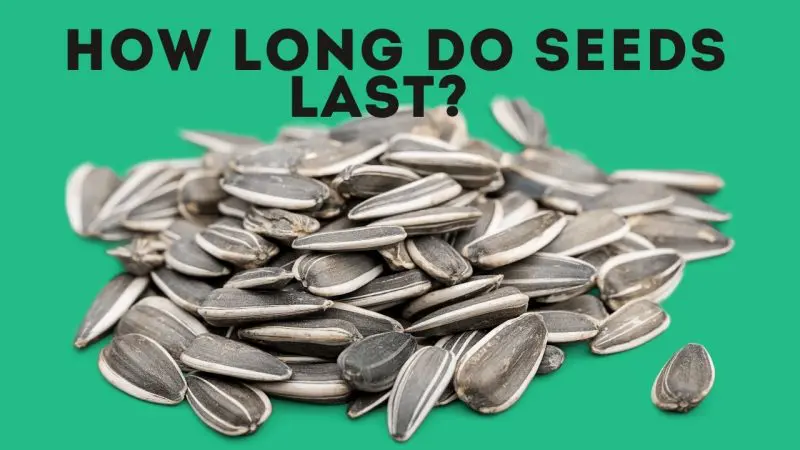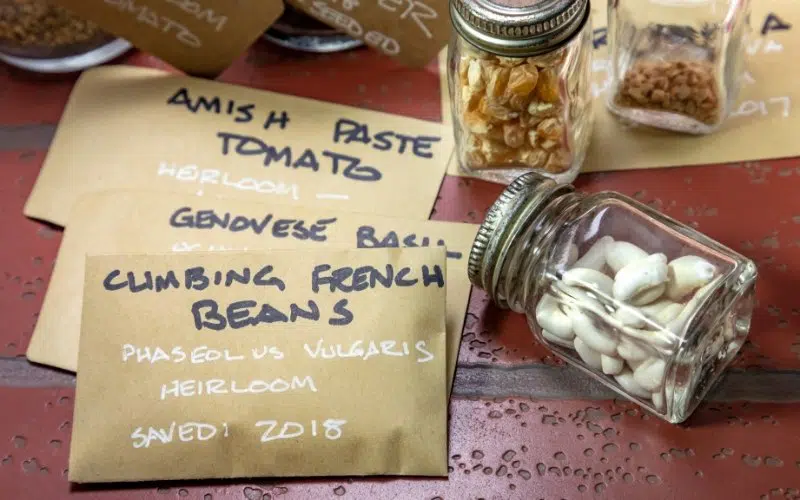As the growing season begins, you might start going through your seed packets from previous years and wondering if they are still good. “How long do seeds last?”
But you can easily figure out whether your garden seeds are still viable or not.
So how long do seeds last before they can no longer be used? The answer is that it depends.

How Long Do Seeds Last? Are Your Old Seeds Still Able to Germinate?
You can do a germination test which will help you determine if your seeds will grow into healthy seedlings and eventually a beautiful garden.
But just because they germinate doesn’t mean they are going to make it to the stage where they are able to be harvested.
Conducting a Germination Test
A germination test will help you determine the life expectancy and seed viability of the seeds in question. Essentially, you try to get a % of your seeds to germinate in order to determine if the rest of the seeds are still good.
You can test seeds germination rates using a few simple household items:
- Paper towel
- Seeds
- Water
- Ziploc/plastic bag
Wet the paper towel until it’s moist, but not soaked. If it’s dripping water it’s too wet.
Place the seeds onto the damp paper towel and put them into the plastic baggy, or Tupperware container.
You can place these in your kitchen cupboard or closet, someplace that is dark and a little cool. Check on them every day to make sure the paper towel is still damp.
After 2-3 days you should start to see some germinating seeds. If not, wait a few more days. If it’s been 10-14 days and you don’t see any movement happening, it might be that its been too long and your seeds are no longer able to germinate.
Take the number of seeds sprouted divided by how many seeds you tested, and that gives you your germination rate.
For example, if you tested 20 seeds, and 10 seeds sprout, that’s around a 50% germination rate.
What Affects the Viability of Seeds?
There are a few determining factors that will help you decide if the seeds are still strong enough to reach that harvest phase.
1. The Types of Seeds
Some vegetable seeds will last longer than others, so there isn’t a hard and fast rule with this one. If we’re talking about broccoli or lettuce seeds, you’re in luck, as they usually last longer.
But if we’re looking at corn seeds or onions, the odds are not in your favor. See the viability chart below to get more information on how long specific types of seeds are good for.
2. The Age of the Seeds
Did you buy those seeds last season, or were they something you tested out a few years ago and forgot about until now? When the seed was packed will have a lot to do with how well they are going to germinate and grow for you.
3. How the Seeds Were Stored
If you’re like me, you had the best intentions of storing your seeds in the perfect cool, dry place – but then you got sidetracked by actually sowing seeds and forgot to put them there and they’ve been sitting in your grow room where the humidity gets up pretty high.
If you’re not like me, you might just be in luck, but if you are, it might be time to buy some new seeds. And get a good container (I like this one) to protect your seeds in the future.
Even leaving the seeds out in a humid or warm place for a few days can impact the future germination rates. It’s best to immediately put your seeds in a cool, dry place for seed storage until you need them again.
If you’re saving seeds yourself from this season’s plants, make sure you’re storing them properly in a cool, dry place.
How Long Do Seeds Last?
I know, I know, I’ve been playing around with a lot of scenarios, so let’s figure out if your seeds are still good.
Here are some common seed varieties along with their corresponding shelf life.
Seed Viability Chart
Here is a viability chart for determining how long your vegetable seeds and flower seeds last.
| Alfalfa | 5 years |
| Annual flowers | 3 years |
| Artichoke | 4 years |
| Arugula | 6 years |
| Asparagus | 4 years |
| Barley | 5 years |
| Basil | 5 years |
| Beans | 4 years |
| Beets | 5 years |
| Borage | 4 years |
| Broccoli | 5 years |
| Brussels sprouts | 5 years |
| Buckwheat | 5 years |
| Cabbage | 5 years |
| Caraway | 2 years |
| Carrot Seeds | 4 years |
| Catnip | 3 years |
| Cauliflower | 5 years |
| Celery | 5 years |
| Chamomile | 4 years |
| Chicory | 5 years |
| Clover | 5 years |
| Collards | 5 years |
| Corn | 3 years |
| Cucumber | 5 years |
| Dandelion | 2 years |
| Dill | 4 years |
| Eggplant | 5 years |
| Endive/Escarole | 5 years |
| Fennel | 2 years |
| Kale | 5 years |
| Kohlrabi | 5 years |
| Lavender | 4 years |
| Leeks | 2 years |
| Lemon Balm | 4 years |
| Lentil | 2 years |
| Lettuce | 5 years |
| Marigold | 3 years |
| Marjoram | 4 years |
| Melon | 5 years |
| Millett | 2 years |
| Mint | 4 years |
| Mustard | 4 years |
| Oats | 4 years |
| Okra | 2 years |
| Onions | 2 years |
| Oregano | 4 years |
| Pansy | 2 years |
| Parsley | 4 years |
| Parsnip | 2 years |
| Peas | 4 years |
| Peppers | 5 years |
| Perennial Flower Seeds | 5 years |
| Pumpkins | 5 years |
| Radish | 5 years |
| Rhubarb | 2 years |
| Rosemary | 4 years |
| Rutabaga | 5 years |
| Rye | 3 years |
| Sage | 3 years |
| Sorghum | 2 years |
| Soybean | 5 years |
| Spinach | 5 years |
| Squash | 5 years |
| Strawberry | 5 years |
| Swiss chard | 5 years |
| Thyme | 4 years |
| Tomato Seeds | 5 years |
| Turnip | 5 years |
| Watermelon | 5 years |
| Wheat | 5 years |
Do Seeds Actually Expire?
Technically? No. But the germination rates greatly diminish after some time has passed. And as I mentioned, even if the seeds germinated, there is no guarantee it’s going to bear fruit or grow long enough to be harvested.
How to Tell if Vegetable Seeds Are Good
The first hint might come from the seed packet itself. Most seed packets come with an expiration date, or at least the packing date of the seeds.
So you can check the expiration date on a seed packet for your first clue. If you’ve saved seeds in the past, make sure you’re checking the date there as well.

Will 20-year-old seeds grow?
Luke from MI Gardener germinated a seed that was 87 years old so yes, I’d say a 20-year-old seed has a chance.
Now, of course, he’s a professional so not every old seed (or 87 year old seed) is going to germinate. If you’re planning on growing a bountiful garden from these seeds, then I’d probably skip trying to get all of those old seeds to germinate.
But if you are just having fun trying to see if you can get it to germinate, then heck yes, go for it!
Storing Seeds Long Term
Seeds can last for a while, but they can’t be stored forever – although 87 years is a long time!
The storage conditions you provide for your seeds are really important and are one of the determining factors in the question of how long your seeds will last.
Your best bet to improve future seed viability is to store seeds in an airtight container (like glass jars or plastic containers) in a cool place away from sunlight. Those are the 3 key factors:
- Dry
- Cool
- Dark
If you store seeds in an area that is too humid, or the temperatures are too high, they will only last for a few months.
Some seeds can last up to five years, while other seeds may only have a lifespan of one year or less.
So next time you’re going through the seed catalog and trying to decide how many seeds to buy, keep in mind that they don’t last forever.
Don’t be like me and try and “save money” by buying seed packets of 250 seeds instead of 25 because it was only $1 more. If you’re not going to get to those seeds before they expire, don’t buy them.
Yes, that was personal advice – carry on 🙂



